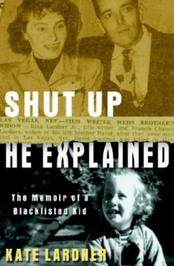A WRITER'S WIT |
My Book World

About halfway through this book, I realized I had read it before—not because I recognized the material but because I found little thumbnail indentions indicating where I’d stopped a reading session. My first “review,” sketched in 2004, was rather short and not very positive: Poor writing and poor editing. What could have been enlightening and touching was scattered and uninteresting. Lardner keeps an emotional distance throughout that is not very pleasant.
In a way, I still feel the same. The writing is fine enough; it just lacks a certain depth. Perhaps that is the point where a better editor might have helped the author. Much of the book is really about Kate Lardner’s father, Ring Lardner, Jr., a distinguished screenwriter who is blacklisted in the 1950s because he refuses to answer the question at a hearing whether he is or ever has been a communist. He spends twelve months in prison simply for attempting to practice his First (or Fifth) Amendment right to speak (or not). And, of course, such an event does have harmful effects on a burgeoning family: A wife, herself a working actor, who ceases to be offered film roles because she is related to Ring; a daughter and two sons who need him to balance out an impatient mother who, though loving, is also bound and determined to have her own career.
What is most troubling, I think, is the pacing. Of ten chapters, “The Penal Interlude,” is the longest at 120 pages. Conclusions that the author could draw about the effects on her as a “blacklisted kid” are missing or shortchanged. At the end of the book, Lardner gives a hurried account of her college years, her stumbling around to find out what she wishes to do with her life, thumbnail sketches of her two marriages, and boom, we’re done. Either the book should focus more on her father, or she should have a book longer than 272 pages, in order to discuss how being a blacklisted kid has affected her entire life (she’s about sixty at the time she writes the book). This time around I don’t notice the “emotional distance” as much as I do in 2004, but there exists rather a flippant tone that seems to reduce the import of what she is saying about one of the most destructive periods in US political history and its ramifications for her family. Perhaps it’s her way of dealing.
NEXT FRIDAY: My Book World | Paul Monette's Last Watch of the Night: Essays Too Personal and Otherwise.



 RSS Feed
RSS Feed